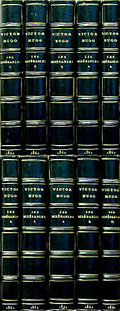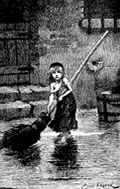|
|
<< INDEX < NOVELS
1862, Les Miserables
Original title: Les Misérables
 As early as the 1830's, Hugo was planning a long novel about unjust legislation and social misery, Les Misères. A preliminary draft was made in 1840, consisting of four parts; Story of a Saint, Story of a Man, Story of a Woman and Story of a Doll. From November 1845 to 1848, he devoted most of his time to what he now called Jean Tréjean. Hugo wrote in the mornings and Juliette made fair copies. But due to political turmoil and other projects, the work was interrupted and it was not until the tranquility offered by exile, that he, twelve years later, was able to continue writing with his usual efficiency. In fact, from the end of April 1860, he worked at such a pace that almost everyone in the household had to be involved in the process, copying and collating texts - Hauteville House had turned into a novel manufacturing plant. As early as the 1830's, Hugo was planning a long novel about unjust legislation and social misery, Les Misères. A preliminary draft was made in 1840, consisting of four parts; Story of a Saint, Story of a Man, Story of a Woman and Story of a Doll. From November 1845 to 1848, he devoted most of his time to what he now called Jean Tréjean. Hugo wrote in the mornings and Juliette made fair copies. But due to political turmoil and other projects, the work was interrupted and it was not until the tranquility offered by exile, that he, twelve years later, was able to continue writing with his usual efficiency. In fact, from the end of April 1860, he worked at such a pace that almost everyone in the household had to be involved in the process, copying and collating texts - Hauteville House had turned into a novel manufacturing plant.
For the characters of Valjean and Javert, Hugo found inspiration in Eugène François Vidocq, the criminal-turned-police who became the first chief of the Sûreté and who is mentioned in several places in the novel. Vidocq was also a personal friend of Hugo's and several other contemporary Parisian writers. The bishop, monsignore Myriel, was identical to the real bishop Miollis who, according to stories Hugo had heard, had received the convict Pierre Maurin just like Myriel did Valjean. Marius was of course a depiction of the young Hugo.
In the spring of 1862, Les Miserables was completed. It had taken Hugo 17 years to produce what would become his magnum opus and one of the most influential novels ever written. By now, he was well aware of his worth and when his publisher Hetzel was unable to meet his demand of 300,000 francs, Hugo turned to the Belgian publishing house Lacroix and Verboeckhoven. The first part, Fantine, was launched simultaneously in almost all major cities in the world in a marketing campaign never seen before. Press releases had been issued during six months prior to the launch so it was common knowledge that more than just another novel was to be expected.
 It was an instant success and sales clearly showed that Hugo had managed to do something that no one had done before; he had reached the masses with a work of serious fiction. Everybody, all over the world, was reading the story of Jean Valjean, Fantine, Javert and Cosette. In Sweden, two different translations were published, in all 5,500 copies (for comparison, the French first edition was 40,000 or 48,000 copies). In Paris, the different parts sold out within hours. It was an instant success and sales clearly showed that Hugo had managed to do something that no one had done before; he had reached the masses with a work of serious fiction. Everybody, all over the world, was reading the story of Jean Valjean, Fantine, Javert and Cosette. In Sweden, two different translations were published, in all 5,500 copies (for comparison, the French first edition was 40,000 or 48,000 copies). In Paris, the different parts sold out within hours.
The reviews were mixed. Politically, Les Miserables was a thorn in the flesh of the establishment and received criticism accordingly. Lamartine considered it dangerous to plant the desire of the impossible into the minds of the masses. Baudelaire rejected its philosophy of progress. The Catholic press launched a campaign against the novel and some priests even suggested that Satan wrote it. But its impact on society was evident; soon, the issues highlighted in Les Miserables were on the agenda of the National Assembly. The futility of Hugo's political career was more than compensated by his literary achievement; the Hugo that was hissed by the National Assembly of France was now fretting on the conscience of the World.
Les Miserables is today regarded as one of Mankinds greatest literary accomplishments and the characters of Valjean, Javert, Fantine and Cosette have their given seats in any hall of great fiction. Their destinies have been adapted for cinema, television and musical stage to an extent equaled by few other works of literature.
|

|









